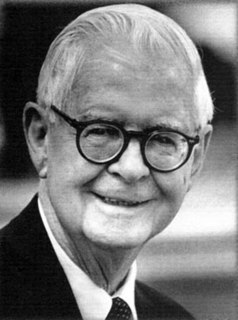A Quote by Confucius
See a person's means ... Observe his motives. Examine that in which he rests. How can a person conceal his character?
Related Quotes
Nature never rhymes her children, nor makes two men alike. When we see a great man, we fancy a resemblance to some historical person, and predict the sequel of his character and fortune, a result which he is sure to disappoint. None will ever solve the problem of his character according to our prejudice, but only in his high unprecedented way.
When we try to describe one person to another …, what do we say? Not usually how or what that person ate, rarely what he wore, only occasionally how he managed his job—no, what we tell is what he said and, if we are good mimics, how he said it. We apparently consider a person's spoken words the true essence of his being.
The act of the soul, in surrendering itself into the hands of Christ, forms a connecting bond between Him as the Vine and the soul as the branches, which communicates life, strength, nourishment, and beauty. In a word, with a just view of the character, and a supreme attachment to the person of Christ, the believer yields himself into His hands as a full and complete Saviour. Him he receives; upon Him he rests, and rests for time and eternity.
There must be only three supreme values which govern a person's life: Reason, Purpose, and Self-esteem. Reason, as his only tool of knowledge--Purpose, as his choice of the happiness which that tool must proceed to achieve--Self-esteem, as his inviolate certainty that his mind is competent to think and his person is worthy of happiness, which means: is worthy of living. These three values imply and require all of man's virtues, and all his virtues pertain to the relation of existence and consciousness: rationality, independence, integrity, honesty, justice, productiveness, pride.
An isolated person requires correspondence as a means of seeing his ideas as others see them, and thus guarding against the dogmatisms and extravagances of solitary and uncorrected speculation. No man can learn to reason and appraise from a mere perusal of the writing of others. If he live not in the world, where he can observe the public at first hand and be directed toward solid reality by the force of conversation and spoken debate, then he must sharpen his discrimination and regulate his perceptive balance by an equivalent exchange of ideas in epistolary form.
This means that if a person fulfills his or her vocation as a steelmaker, attorney, or homemaker coram Deo, then that person is acting every bit as religiously as a soul-winning evangelist who fulfills his vocation. It means that David was as religious when he obeyed God’s call to be a shepherd as he was when he was anointed with the special grace of kingship. It means that Jesus was every bit as religious when He worked in His father’s carpenter shop as He was in the Garden of Gethsemane.
The doctrine called Philosophical Necessity is simply this: that, given the motives which are present to an individual's mind, and given likewise the character and disposition of the individual, the manner in which he will act might be unerringly inferred: that if we knew the person thoroughly, and knew all the inducements which are acting upon him, we could foretell his conduct with as much certainty as we can predict any physical event.







































